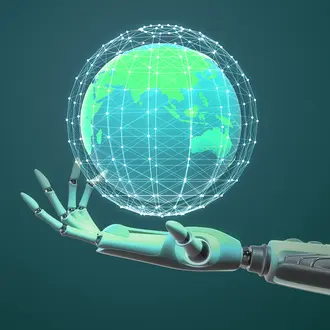Artificial Intelligence
The case for taxing robots — or not
Robots aren’t taxed on the paychecks they’re taking from human workers. Should companies be held responsible?
Should your Roomba need a W-2?
Probably not, but it’s an amusing thought when debating the more serious topic of whether or not a robot should have to pay taxes — and how to do it.
During the June MIT Technology Review EmTech Next event, two experts argued both sides of the question before an audience at the MIT Media Lab in Cambridge, Massachusetts.
Ryan Abbott, professor of law and health sciences at the University of Surrey, argued in favor of taxing robots, while Ryan Avent, economics columnist for The Economist, argued against the idea. Both agreed there needs to be a shift in tax burden from labor to capital. Avent, however, carried the most audience votes by the end of the debate.
Here are some highlights from each of the men’s arguments.
Leveling the playing field for humans and machines
The federal government gets about 50% of its revenue from income taxes. If robots replace the human workforce, that funding disappears, Abbott said.
“When firms automate, the government loses tax revenue, potentially a very significant amount depending on which predictions you believe about the future of automation, and potentially hundreds of billions of dollars a year in the aggregate,” he said.
Whatever impact automation does have on the human workforce, it will be hard to offset with federally-funded retraining, education, and social benefits, if the government has less money to work with, Abbot said.
Companies also pay a 6.2% payroll tax for social security [matched by 6.2% from employees]. Robots aren’t on the payroll. Even if a person is the better choice for a job, companies are going to want to automate to save money, Abbot said.
“To level the playing field for people and machines, you would need to do away with the tax advantages machines have over people or create new tax advantages for people to offset the ones [machines] have right now,” Abbott said. “A robot tax really is saying we need to tax capital more than we're taxing labor.”
Abbott suggested a variation of robot taxes, for example: raising taxes for high profit companies that rely a lot on automation.
“Yes, there's a limit to how much you can increase corporate taxes on capital gains without having problems with that, but there are also ways that you can increase the share paid by businesses of capital, and decrease that pain on labor to have a fairer system,” he said.
New technologies can benefit everyone
Avent didn’t see the same dire future of displaced workers.
“The jobs that we think might be lost to automation aren’t being lost anywhere near to the degree that we might expect or even hope at this point,” Avent said. “There's a lot of ways to look at the data and see that.”
Most robots are used in manufacturing, specifically the automotive industry. But most people don’t work in manufacturing, they’re in the services sector, Avent said.
Avent also pointed to record employment numbers in other rich countries – like Japan, Germany, and South Korea — despite their high rate of robots in the workforce.
“We also have to think about the fact that when robots are deployed in the workforce now, they're typically deployed in cases where the jobs are highly routinized, where it's very easy to kind of describe the actions the robot needs to go through,” Avent said, adding it’s not even clear those jobs are going to be available down the road, regardless of whether a robot or human fills them.
He also pointed to the Industrial Revolution to illustrate that while it can be scary to think of machines doing more things than humans currently do, in the end “everyone ends up much better off.”
“I think it would just be a shame if for lack of ideas or lack of faith in our ability to change society for the better in response to technology, we took steps to try to restrain the use of new technologies which could end up benefiting quite a lot of people,” Avent said.




